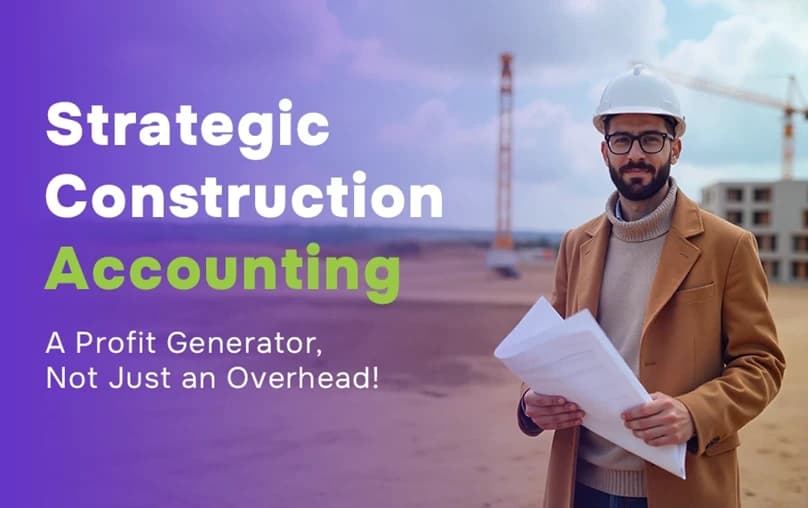
Running a construction company is a lot like trying to juggle multiple projects at once. Between rising material costs, fluctuating labor rates, and overhead creeping up, the pressure to keep things profitable can feel like a constant uphill battle.
It’s like you’re trying to build a solid house, but the foundation keeps shifting beneath you. Profit margins are getting tighter than a pair of jeans fresh out of the dryer.
According to the Construction Financial Management Association’s 2023 benchmarking study, in 2022 top-performing construction firms were locked in a solid 9.9% profit, while most companies were stuck closer to 5%.
It all boils down to one thing, finding a way to run a more efficient operation, accurate job costing and staying on top of costs before they chew up your profits.
The Job Costing Headache
Picture this: You’re a construction company owner, staring at your job costing and wondering why the actual numbers are so different from what you estimated. You bid on the project, put in the hours, bought the materials, and paid the crew, but when you look at the final numbers, they’re not adding up. As you dig deeper, you realize you miscalculated a few key things, overtime costs that slipped through the cracks, material waste that piled up after being left out in the open, and hidden overhead costs like sanitation and temporary office space that didn’t catch your eye.
This isn’t just your problem; it’s the struggle for many construction business owners. Job costing, or figuring out the real cost of a project, feels like trying to nail Jell-O to a wall.
That’s where strategic accounting partner comes in, helping you track every cost, control overhead, and spot profit leaks.
Breaking Down the Job Costs: Labor, Materials, and Overhead
When it comes to job costing, three major components will dictate whether you’re in the green or drowning in red: labor, materials, and overhead. These are the big hitters that can either make or break your project’s profitability. Let’s dive into what each one means and how they impact your bottom line.
Labor: The Big Chunk of Your Budget
Labor is the heavy hitter; it’s the largest cost in most construction projects. But it's not just about the hourly wage you’re paying your crew. There are other expenses like benefits, workers' compensation, overtime, insurance and even the occasional sick day. And, if you’re not keeping track of all those labor costs, things will get messy real quick.
When you track labor properly, you will see exactly where your money’s going, and it’s easier to spot when things are getting out of hand, whether overtime creeping in or projects taking longer than expected. This allows you to step in before things spiral out of control and drain your profits.
Materials: What You’re Building With
Materials are next in the list, and they are genuinely tricky to track. Direct materials are the things you will physically see like concrete, steel, wood, wiring, brick, stone, and aggregates.
If you’re not tracking everything properly, you will end up overpaying or even worse, materials being swapped with lower quality without your knowledge. Fraud will easily sneak in when materials aren’t carefully monitored.
And trust me, material waste adds up fast if it’s not tracked, whether it’s due to leftover scraps, damage, or improper storage. Keeping track of everything that gets used, wasted, or swapped helps you stay within budget and prevents unnecessary costs.
Overhead: The Hidden Costs That Destroy Your Margins
Lastly, you’ve got overhead, which includes all the stuff that’s not directly tied to the project but still needs to be tracked. Overhead costs are like the sneaky little leaks that drain your profits. This includes things like temporary office space on construction sites, equipment rental, permits, sanitation facilities, office supplies, utilities, and even your marketing expenses.
If you’re not tracking overhead carefully, you might not realize how much it’s eating into your budget until it’s too late.
Get Job Costing Right, and Your Profits Will Follow
When job costing is done correctly, the benefits are huge. By tracking every expense meticulously, you will keep your budget on track and ensure accurate billing for the work you’re doing. With the accurate job costing, you position your business alongside top-performing construction firms, achieving profits as high as 9.9%, just like the leaders in the industry.
Here’s how job costing makes your profits soar:
- Keep Your Budget in Check: By comparing estimates to real-world numbers, you will spot where your cash is slipping through the cracks. If you’ve gone over budget, you’ll know exactly where to clamp down and regain control. This level of insight helps you manage your margins better and ensures you’re not leaking money.
- Stay On Track as You Build: As your project progresses, you’ll have a real-time picture of whether cost aligns with expectations. If a certain task is running over budget or taking longer than anticipated, you will be able to address it mid-project to prevent it from snowballing into a larger issue.
- Get a Grip on Your Cash Flow: Let’s face it, paying upfront for materials and labor while waiting for client payments will mess with your cash flow. With job costing, you are able to track every penny spent and keep your cash flow healthy even if payments are delayed.
Take Control of Your Profits
Managing job costs is a tricky business, but with the right team on your side, you gain real control over your finances. By tracking every penny of labor, materials, and overhead, you're able to spot issues before they become costly mistakes.
With an outsourced construction accounting expert handling your finances, you’re not just keeping things on track, you’re actively boosting profitability. Real-time insights from experts ensure smarter decision-making, maximizing margins and streamlining operations.
So why waste time stressing over the numbers when outsourced accounting can help your business stay profitable and efficient.

Shekhar Mehrotra
Founder and Chief Executive Officer
Shekhar Mehrotra, a Chartered Accountant with over 12 years of experience, has been a leader in finance, tax, and accounting. He has advised clients across sectors like infrastructure, IT, and pharmaceuticals, providing expertise in management, direct and indirect taxes, audits, and compliance. As a 360-degree virtual CFO, Shekhar has streamlined accounting processes and managed cash flow to ensure businesses remain tax and regulatory compliant.
You might also like:
- The Accounting Reality Behind Claim Denials That Quietly Drain Clinic Revenue
- 9 Practical Strategies to Improve Cash Flow for Small Businesses
- Qualified Improvement Property (QIP): The Smart Way to Accelerate Depreciation on Commercial Renovations
- Why Smart E-Commerce Owners in the U.S. Are Outsourcing Their Accounting
- The Ultimate Guide to SaaS Accounting: Metrics, Revenue, and Growth Hacks
Listen Exclusive Podcast On

